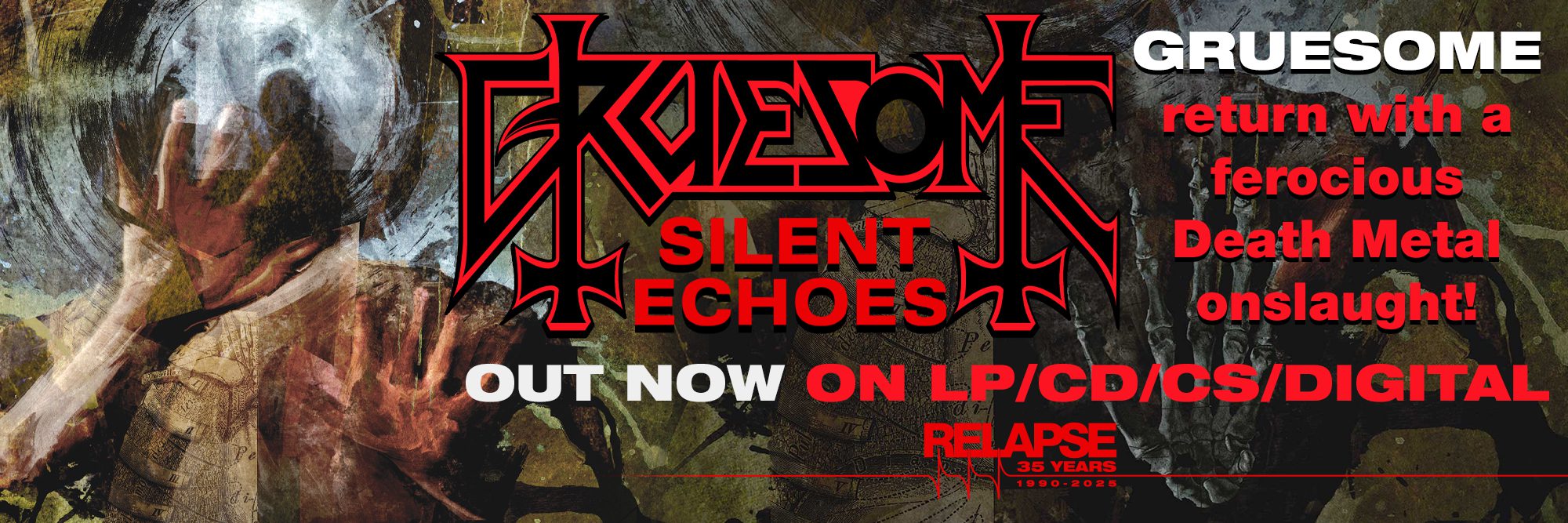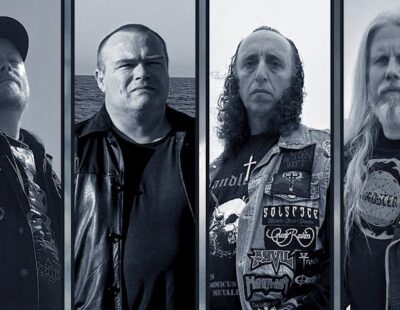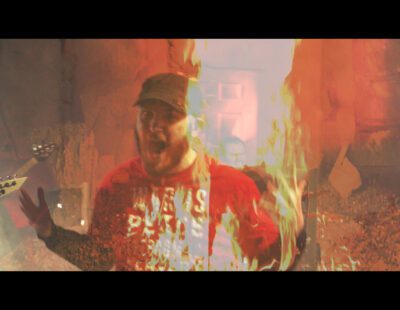
Sahil Makhija, better known as Demonstealer, is what you’d call one of metal’s renaissance men. Or a metal scene polymath. Or, as the bio written in support of The Holocene Termination, the latest release by his namesake band, he’s “long been one of the pillars of the heavy metal scene in India.”
Like many of us, Makhija discovered, fell in love with and became obsessed with metal early on and hasn’t stopped. Metal wasn’t “a phase.” Metal was, as is, life. For Makhija, this meant being the founder of India’s first independent metal label, opening India’s first recording studio to cater to the heavier side of things, being the co-founder of India’s first extreme music festival and playing the role of Energizer Bunny and vocalist in Demonic Resurrection, arguably the biggest name in the history of the Indian metal scene.
These days — as you’ll learn in the detailed interview below — Makhija has scaled back on many of the extracurricular activities that he’s become known for and is instead focusing his time and energy on Demonstealer, the project he’s been captaining since 1998. Demonstealer’s newest offering is The Holocene Termination, an EP rife with blackened death thrash in the vein of The Aborted, Behemoth, Cannibal Corpse and Obscura that has Makhija welcoming guest appearance contributions from Eugene Ryabchenko (Fleshgod Apocalypse), Anton Zhikharev (Neurogenic), Simon Schilling (Marduk), Robin Stone (Norse, ex-The Amenta) and Jeff Hughell (Six Feet Under) amongst a cast of others.
Today, we’re presenting a group play through video of one of the EP’s tracks, “What She Creates, She Will Destroy.” The Holocene Termination was originally released back in early December, so act quick at the links below if what you hear, see and/or read turns your crank and you want to scoop up a physical copy.
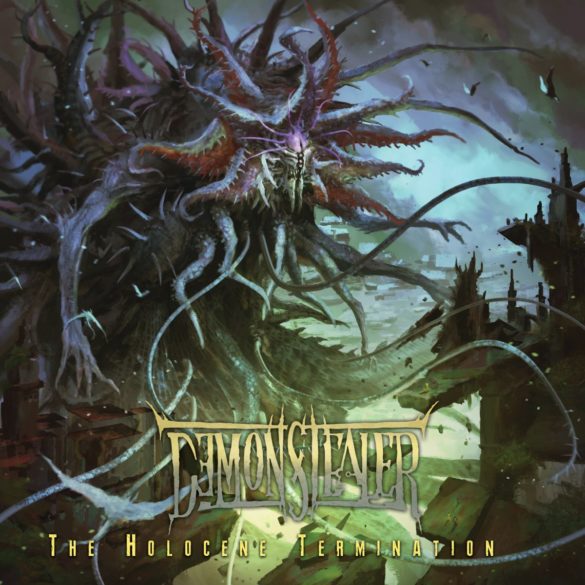
Tell us about your earliest encounters with metal and how you came to discover and love the music?
Sahil “Demonstealer” Makhija: My first memory of metal is listening to “Running Free” and “Phantom of the Opera” by Iron Maiden on my Walkman during a class trip. My friend, Aditya Udas had given me the tape which he’d gotten from his older cousin. That was my first brush with metal, I must have been in the 6th grade, probably 12 years old. However, after that I didn’t deep dive into metal until about two years later when my friends gave me some Metallica to listen to. After that I was hooked and I just kept wanting heavier and heavier stuff. I was fortunate to have access to the internet where I was able to find more music and download bands that you couldn’t find in any shop here. I don’t know what it was, but just something about the music drew me in. The sound of the distorted guitars, the pounding double bass, the harsh vocals and the lyrical subjects all resonated with me.
What was the climate like 20+ years ago when it came to metal’s profile and acceptance in India? I regularly encounter PR stuff from new and not-so-new Indian bands, so obviously things have changed in terms of the sheer volume of everything, but how has the perception of metal by the general public changed over the years?
DS: In the late ‘90s and early 2000s, when I was just getting into the scene, it was a lot of cover bands. My band, Demonic Resurrection was one of the first bands in the wave of bands that formed at that time who played original music. The audience was not used to that at all and many of us got bottles and stuff thrown at us and also booed while performing. But we persevered through that. In terms of metal music being accepted by people or society, it’s a bit of a unique situation. For the most part, no one largely cared about it because metal music was music that was consumed largely by middle class people or those better off economically. Add to that it’s a niche genre, so the audience size is really small. English music itself is consumed largely by economically well-to-do folks as there are complex economical, social and religious divides in society which all affect these things. But basically none of the general public cares about metal music; they don’t understand it and for most people they don’t even know it exists. I’d say back in the day maybe you’d get stared at if you had long hair and tattoos, but not so much in the cities anymore since popular culture icons like movie stars and cricketers are all sporting these looks and making it quite common. In terms of bands, we’ve gone from a handful of bands playing original music to pretty much every single band being formed with the intent to write and release music. As for public perception, metal remains the same: largely on its own with most people oblivious or unbothered by it. Maybe parents of kids are not fans, but it’s more to do with them wanting their kids to study rather than any actual issue with the music itself. Though they don’t really understand the screaming and shouting.
Have you ever experienced any obvious/overt opposition from people about your involvement in metal?
DS: I wouldn’t call it opposition, but I used to work in a recording studio where a lot of advertising work took place. I’d meet tons of people all who’d give me the same speech of how they were ‘rockers’ in their youth and now they listen to jazz and blues and how I’ll ‘grow out of metal’ eventually. We’ve had a few gigs canceled here and there for odd reasons. One gig of ours in Goa got canceled because we were a “satanic band coming to perform” and also the promoter apparently told a reporter that drugs would be available at the venue. I suspect the drugs were the bigger problem. Most of the other shows were largely canceled due to police permissions to host a concert or something more bureaucratic and the right palms weren’t greased, if you know what I mean.
Was Demonic Resurrection your first band? I understand it’s one of India’s most popular native metal bands; how did that happen? Does popularity at home refer to actual popularity in India or a recognition for being signed to a label like Candlelight and getting out of India to play overseas?
DS: When I finished school I did form a band called Slaves of Pain with two friends of mine. Since it was just the three of us, they both played guitar and I sang. It wasn’t really a band, so I would always consider Demonic Resurrection to be my ‘real’ first band. Honestly, I’d say we were known than we were popular. Whether people liked our music or actually listened to it was a different story, but everyone knew about the band. I think the popularity meant a bit of everything really. We were one of the first bands to go play a massive metal festival abroad, Inferno Festival in 2010 and Brutal Assault. We also won the Metal Hammer Golden God award in 2010. We signed to Candlelight Records and apart from us and Kryptos there were no other bands that had been around as long. We also pretty much managed to play all the major events in India and tour more than most bands. I guess on paper we were popular. Everything else is just subjective.
At what point did you decide that not just playing music was something you wanted to do and that getting involved behind the scenes with the label/fest/studio were things you also wanted to do?
DS: Honestly, I never had any intent to do anything other than play music. I had no choice. There was no infrastructure in India and there was no one else doing anything. If I wanted to play shows I had to organize my own, so I became a promoter. There were no studios that were equipped to record metal and especially at a reasonable cost, so I started recording myself and other bands and started my little home studio. Independent labels didn’t exist in India let alone one that would release a metal album, so I just started my own label. I literally did things because there was no one else to do it. I could either sit and twiddle my thumbs and wait or do it myself. I chose to get off my butt and work. Over time as things improved, I started to let go of all these other things I was involved in.
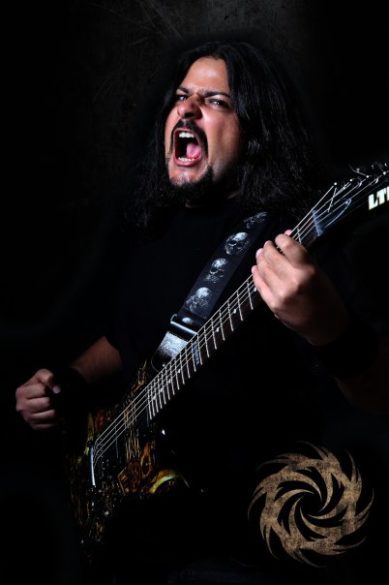
Tell us about the label, fest and recording studio, how each came to be, some of the successes and impacts they have had on the Indian metal scene and what your plans are for each going forward?
DS: Each of those is currently shut and wrapped up. I started recording myself in 1998 when my friend Sunil Thakkar came over and taught me how to do it. He’d learned how to do it online and he came over to my house, played me his first song and I couldn’t believe it. I started writing and recording my own songs over the next two years. I taught myself and in 2000 I released the first Demonic Resurrection album. It sounded terrible, but at the time I thought it sounded good. I offered my services to local bands and they lapped it up given that I was charging only 400 Indian rupees for a song which was maybe $10 back in the day when it was 40 INR to $1. Today it’s like 75 INR to $1, but I just started recording bands and over time I began to improve my skills, upgrade gear and finally in 2010 I converted my garage into a proper soundproofed room. I took on more production work till about four years ago when my Youtube channel took off. I stopped recording other bands and realized I needed to focus on my own music. With the metal festival we did ‘The Resurrection Festival’ which started in 2004 because the band had just got a full new line-up and sound and we wanted a gig to launch ourselves. I worked with then bassist Husain Bandukwala and we decided to host the show as a festival called Resurrection. We had a local Deathfest called ‘Domination: The Deathfest’ which had shut down, so it made sense. After that, we just kept running it because it worked out well for us as a platform for the band and to bring our favorite acts to our city. Finally in 2011, we called it quits as it was just too much work and we had other things to focus on. By this time there were a lot more festivals, venues and opportunities so it made sense. Finally, the label. A friend of mine told me that my stage name, ‘Demonstealer’ sounded better as a record label. So in 2000 when I dropped the first DR album, I put ‘Demonstealer Records’ on the CD. That release was CD-R with a photocopied cover and a very DIY release. In 2005, the band decided we’d have a full professional disc, properly pressed with a booklet, posters and the works. I was the one doing most of the actual management and work for the band and I did a pretty good job on the release with the distribution and PR and that just made me feel I could do the same for other bands in the scene since there was no other metal label. So I officially started it and began releasing local bands. In 2009, I released Behemoth’s Evangelion through my first licensing deal and then in 2012 Dimmu Borgir’s Abrahadabra. After 2012’s releases I officially shut the label because it was just too hard for me to manage as a one man operation.
As far as the new Demonstealer EP is concerned, what was the writing and production process like and how did you get all the guests who played involved?
DS: I started working on this EP some time in 2019 and as I wrote the songs I started thinking about which drummers would fit the tracks. I have a huge wish list of drummers, so it was just a matter of emailing them and checking their availability. I think it was late 2019/early 2020 that I locked in on the four drummers I wanted to work with and sent them the songs I’d written for each one. I like to give the drummers a blank slate and ask them to put their ideas forward and then we have a bit of back and forth on what works and what doesn’t. Once I locked in on the drummers, they all recorded themselves in their respective home studios. After that, I looked around for potential bass players and lead guitar players. Once again, it was a pretty simply process of just sending an email, checking availability and then bouncing ideas before everyone recorded their parts at home. For this EP I knew I wanted a female voice for the final track, so I got in touch with Veronica from Fleshgod Apocalypse and, again, the same process. Finally, once everyone was done with their recording which was in June this year, I got the files and sent them to Studio Hertz for mixing. It’s quite a massive task to make an EP sound cohesive with so many guest musicians. But they did a fantastic job. In fact the hardest part of this process is just the organization and keeping tabs, the actual music production part is super-easy because each musician is handling their own and since they are professionals I just tell them what I need and they deliver it.
Do you have a promotional support plan after the EP is out and now that things are starting to get back to normal, somewhat? In looking at how COVID took live music and touring away and messed with the music industry at the drop of a hat, have you talked about taking advantage of opportunities and going at Demonstealer or other projects even harder because you never know when it could all disappear again?
DS: Unfortunately even without COVID a project like this would be impossible to take live unless I became an overnight sensation and could command like a $1000 guarantee for every show. The logistics and material would require that. Since it’s impossible this has always been an online/studio project. I’ve always found good PR companies to work with to support my releases. I make sure I create interesting and high quality videos for every song and use the tools available to musicians today to try and get the music out. So, this project honestly was never affected by the pandemic. For me the pandemic made me realize just how lucky and privileged I am to be able to just make music. So it’s just inspired me to keep making music and not stop. It’s been really hard though for all the touring musicians and I’m glad that things are getting back to normal slowly so that they can start touring again and making a living.

